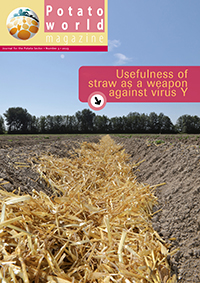Already a subscriber? Activate your premium account

Potatoworld Magazine

Precision agriculture is a farming management concept based on observing, measuring and responding to inter and intra-field variability in crops. How can it help to meet the challenges Agriculture faces? In a Dutch Farm of the Future, we combine agro-ecological knowledge with precision agriculture technologies.
When you search the internet on ‘Farm of the future’, you find millions of hits. And searching for ‘Farm of the Future’ video’s only, you still get too many hits to view in one week time. This shows the popularity of the topic. In the movies, a range of challenges for agriculture to be met on Farms of the Future are mentioned; more biodiversity, nature inclusiveness, zero emissions of nutrients, pesticides and greenhouse gasses, energy neutral, and climate smartness. This all besides the agricultural production function and making a fair farm income. Solutions are also diverse, I name a few; precision, smart, pixel, agro-ecological, robot, vertical, digital farming and more. So, many challenges and solutions.

How do you handle all these challenges in real life? Wageningen University & Research started a project in 2020 named Boerderij van de Toekomst (Farm of the Future) in which we try to address all challenges arable farming faces in The Netherlands. These challenges are summarized in what we call circular agriculture (national policy of Ministry of Agriculture, Nature and food). On the Farm of the Future FieldLab in Lelystad we grow on ca. 30 ha clay soil 8 crops, including early and late potato varieties, in 3.15 m and 22 m wide strips. The arable farm is managed in a way that it (1) maintains natural resources (e.g. soil fertility), (2) is climate robust, (3) grows resilient varieties, (4) applies IPM and minimizes pesticide use with (almost) zero emissions and residues, (5) minimizes artificial fertilizer use and closes nutrient cycles, (6) is at least energy neutral and positive on greenhouse gas emissions, (7) stimulates biodiversity and contributes nature values, (8) applies sustainable water use, and (9) increases the socio-economic situation of the farmer. We implement agro-ecological knowledge and technologies on this FieldLab farm from TRL levels 5–6, meaning that the solutions have passed the stage of proof of concept and (nearly) have demonstrated effective use in an outdoor experimental situation. Beetle banks and robots. And a digital farm dashboard for farm management. And cooperation with dairy and sewage plants to close nutrient cycles. You are welcome to follow us on www.farmofthefuture.nl. By 2030 we aim to meet the KPI’s set for the 9 objectives. And we gladly interact with other Farms of the Future, like the McCain initiative with the same name.
Will there still be a business in farming when all the objectives have to be met? If you look on social media, there are many interesting views. Some believe in shorter value chains to consumers. This might be a business model for a few farmers in The Netherlands, despite ongoing debates if this is more sustainable. It is clear that the earning capacity of farms decreases due to all social challenges that have to be met as long as the price for agricultural products does not increase. Another way to increase the earning capacity of farmers is data farming: get a reward for data showing positive contribution to social challenges. This is a popular topic too nowadays. See e.g. the Dutch Precision Agriculture 4.0 project. EU and national digitalization strategies are proposing farmer’s data spaces. The Farm of the Future could be a data-driven farm in 2030. ●
Dr. Ir. Corné Kempenaar
WUR & Aeres
Corne.kempenaar@wur.nl
References:
https://farmofthefuture.nl/en/
https://www.wur.nl/nl/Onderzoek-Resultaten/Onderzoeksprojecten-LNV/Expertisegebieden/kennisonline/Precisielandbouw-4.0.htm
Events
©2015 - 2024 Potatoworld | Webdesign and realisation COMMPRO